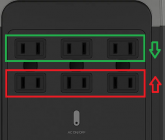Thank you for sharing that picture.
I am somewhat relieved that there is a possibility the EVSE charger that came with my Nissan Leaf could work.
In their marketing videos, they've used the Tesla as an example, but I always assumed, any manufacturer supplied 110V charger should just work. I hope I am right about that...
I am somewhat relieved that there is a possibility the EVSE charger that came with my Nissan Leaf could work.
In their marketing videos, they've used the Tesla as an example, but I always assumed, any manufacturer supplied 110V charger should just work. I hope I am right about that...
Glad to hear some more backers posting thoughts. I'm looking forward to December so I can play around with my DELTA. In regards to the grounded AC outlets. This image was taken directly from EcoFlow's video of the DELTA charging up the Tesla model 3:
View attachment 1588
It looks to me like there is a hole for the grounding lug of the extension cord to sit in. Now obviously there is no actual connection to a ground rod like there is in normal house wiring, but the cords should work.
I wanted to attach the full video in mp4 format but the forum won't let me, check it out on their campaign page though. I hope to own a Tesla one day, been dreaming about it for years. This could buy someone with an EV a few miles at least in an emergency.





